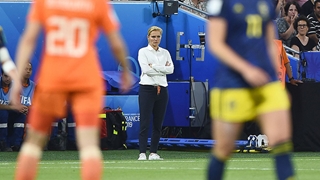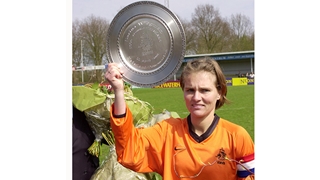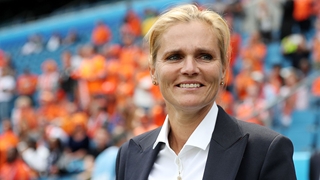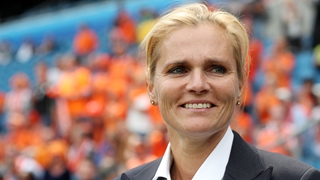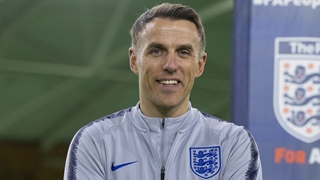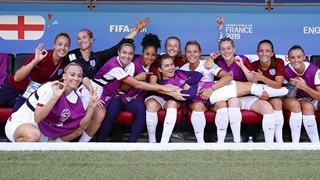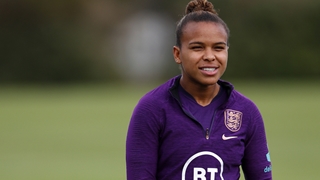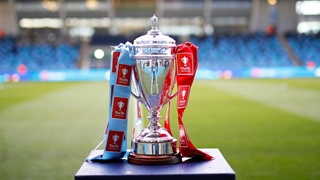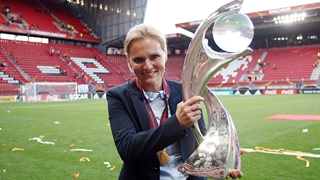
“Some people plan their whole careers. I’m not like that. I know what I want, but I wait until the time is right – until I feel ready to take the next step. Everything at its right time.”
The words of the future England Women’s head coach Sarina Wiegman back in 2018 during a feature with the Coaches’ Voice.
It’s fair to say her move to join the Lionesses next year should perhaps come as no surprise, given her record of taking on challenges and challenging herself and others, as well as being something of a pioneer for the female game throughout her life and career.
We already know the top line information; as a player she became the first Dutch female centurion, when she reached 100 caps for the Netherlands with an appearance against Denmark in 2001.
And after moving into coaching, she’s remained a trailblazer in her homeland and become one of the big names in the women’s game.
Among the many highlights, she became the third Dutch female to earn the UEFA Pro Licence in 2016 and then, later the same year, she was the first woman to coach with a men’s professional club in her homeland following a season-long spell as an assistant with Sparta Rotterdam.
“The players had to get used to me and I had to get used to them, too,” she explains.
“As the only female coach there, I knew I had to show that I had quality. That’s what I worked on all day. Work hard, put quality into everything and deliver.”
Her involvement as head coach of the Netherlands national team has seen her lead the, to the EURO 2017 title on home soil, an honour which helped her land FIFA’s Best Women’s Coach award later the same year, before the Oranje Lionesses finished as runners-up at last summer’s World Cup.
Impressive work indeed, but behind the 104-cap international playing career as a midfielder and winning two Dutch championships and one KNVB Cup with her domestic club Ter Leede, her success is backed up with years of work and study to become the coach she is today.
Growing up in her hometown of The Hague, she began playing football around the age of six along with her twin brother.
Times weren’t quite as simple in the Netherlands back then, as girls were banned from playing football on the same team as boys and with no girls’ teams around, a young Sarina would cut her hair short to join her sibling’s team, ESDO.
While many of her friends weren’t allowed to join her due to their disapproving parents and she often came up against opposition folks who made it vocally clear they didn’t approve of her involvement, she was already ploughing her furrow
And with the backing of her own parents who she describes as ‘open-minded’ and having already cut her teeth in street football with the boys, her football path was set.
Her talent stood out and when she joined her first women’s team, HSV Celeritas, it didn’t take long for things to start happening.
She received her first call-up to the Netherlands senior squad came in 1986, when she was just 16 and she debuted the following year with an appearance against Norway after also winning her first domestic honour by helping Kruikelientjes ’71 to win the KNVB Cup.
But it was a spell in the USA that really opened her eyes to how she wanted women’s football to be in her homeland. A chance meeting with former USA Women’s coach Anson Dorrance at an international tournament in China saw her invited to study at the University of North Carolina and play for the North Carolina Tar Heels under the legendary coach.
During her year in the States, which she describes as life changing, she played alongside the likes of American icon Mia Hamm to help the Tar Heels to a national title as well as improving as a player under the tutelage of Dorrance.
“Playing with the Tar Heels totally changed my mindset,” she said. “In the Netherlands, I always thought that I was different from other girls because I wanted to play every day.
“People told me: ‘you’re too fanatic.’ When I went to Carolina, it was like a soccer paradise for young women."
That's some CV 📄🏆
— Lionesses (@Lionesses) August 14, 2020
Get to know the new #Lionesses head coach, Sarina Wiegman:
On returning home, much to her frustration, she found little change in the women’s game and continued her studies alongside playing before eventually becoming a PE teacher - a job which she says helped her learn more skills in organisation, communicating and developing relationships.
That was a job she kept through her playing and early coaching career, although she admits that in her younger days, even the prospect of making a living from coaching was out of the question.
“I just wanted to help,” she explained in an interview with medium.com. “I knew I couldn’t do it alone, but I wanted to make a difference in the part of the sport I could control. We needed facilities to train every day, good programmes and good coaches. After 20 years, we finally got a system like that.
“There weren’t any prospects of being a coach as a woman when I was young. When I got older, the game improved and there were more chances.”
After starting out coaching with girls’ grassroots teams in her local region once her career on the pitch came to an end, her club coaching career began with a season-long spell with her former club Ter Leede.
She duly led them to the title and KNVB Cup in 2007, before her first move into full-time coaching came in 2007 when she took over at ADO Den Haag in the newly formed Women’s Eredivisie.
"Den Haag asked if I would coach the side on a semi-professional basis. I said no,” she reveals.
“If you want me to take the job, I want to do it full-time. That’s the only way.
“If you want to do something well, then you have to be focused. If I had been a mother, a teacher and a coach, that job wouldn’t have worked for me or the team. They agreed.
“It was a risky decision for me to leave teaching behind, because there wasn’t any continuity in the women’s game at that time. But I just wanted to do it so badly.”
Wiegman quickly caught the eye too, by building a team and culture which would lead to them winning a league and cup double in 2012 before retaining the Cup in the following season.
This didn’t go un-noticed by the KNVB, and she was snapped up to be the assistant coach with the national team in 2014, working under Roger Reijners and then Arjan Van der Laan.
In 2015, the Dutch reached the quarter final of the Women’s World Cup in Canada and Wiegman was starting to see the potential within their ranks.
After two spells as caretaker coach following the departures of Reijners and Van der Laan, she was finally granted the head coach role on a permanent basis in January 2017 – the start of an extraordinary year which would see her profile catapulted into another dimension both at home and abroad.
"If you look at the history of our national women’s team, then you see our chance to win is small, but there is always a chance,” she concludes.
“Winning the Euros gave me a lot of recognition, a lot of respect and it’s the same for the players.
“These days we play in front of packed stadiums. And they are recognised as some of the best players in the world.”
Now, she has a chance to elevate another set of players and Lionesses with England ready to build on their own close calls of the past.
Interview quotes taken from Coaches Voice and Medium.com


